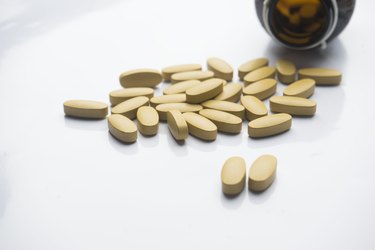
Vitamin B12, or cobalamin, is needed for metabolic functions such as red blood cell production and for aid in protein synthesis. Though it's best to avoid excessive doses of any vitamin, certain situations may justify a daily B12 supplement. High doses are generally safe, but side effects are possible, so check with your doctor before adding B12 to your regimen.
Tip
High doses of B12 supplements may lead to side effects such as nausea, vomiting, diarrhea or weakness. Consult with your doctor before adding any supplements to your diet.
Video of the Day
How Much Do I Need?
According to the Dietary Guidelines for Americans, the daily value for B12 is 2.4 micrograms for adults. Pregnant women should strive for 2.6 micrograms daily, and lactating mothers should get 2.8 micrograms. You might surmise that taking a daily dose of 1,000 micrograms of B12 would represent 417 percent of your recommended daily amount. However, the National Institutes of Health reports that only about 20 micrograms of B12 from a 1,000-microgram oral supplement would be absorbed by your body. And, because vitamin B12 is water soluble, it doesn't generally stay in your body for long. Any excess is excreted through your urine.
Video of the Day
If the vitamin B12 1,000 that you're taking is in the form of a timed-release capsule, such as Nature Made B12, it will dissolve much more slowly in your digestive system. The vitamin will be released incrementally into your bloodstream and be absorbed over an extended period of time, eliminating the chance that it will be excreted from your body, according to Vitamin Insight.
Read more: List of Foods High in Vitamin B12
Who Should Take B12 Supplements?
Although most people get enough vitamin B12 from food, certain situations may require B12 supplementation. According to the National Institutes of Health, these include:
- People who take certain medications that interfere with vitamin absorption
- Strict vegetarians or vegans
- Drug or alcohol abusers
- Those with pancreatic cancer or gastrointestinal disorders
- Individuals recovering from surgery
- Pregnant or lactating women
- Older people with digestive tract conditions or low levels of stomach acid
- Those who have pernicious anemia
Read more: The Best Way to Take Vitamin B12 Supplements
Side Effects From Supplementation
The most common form of B12 supplements, such as Nature Made B12 1000, is cyanocobalamin which is chemically synthesized. If you're prescribed a high-dose vitamin B12 supplement to treat a deficiency, some side effects from this type of supplement, according to RX List, may include:
- Diarrhea
- Nausea or upset stomach
- Itching or rash
- Headache
- Dizziness
- Weakness
- Numbness or tingling
- Fever
- Joint pain
- A feeling of swelling all over the body
Cyanocobalamin B12 supplements may cause low levels of potassium in the blood. Consult your doctor if you experience muscle cramps or irregular heartbeat after taking vitamin B12.
Excess B12 Risk in Pregnancy
Although folate is a necessary nutrient during pregnancy, women should be cautious about taking high doses that can negatively influence a newborn baby's neurological development. A 2016 study by the Johns Hopkins Bloomberg School of Public Health found that pregnant women with excessive B12 levels were three times more likely to deliver a baby with autism than women with normal levels.
B12 Interactions With Medications
The Mayo Clinic warns that some prescription medications have the potential to decrease the absorption of vitamin B12 in your body. These include:
- Proton-pump inhibitors, which are often used to treat acid
reflux
- Drugs for peptic ulcer and acid reflux, including
Pepcid, Zantac and Tagamet, when taken for a prolonged period of time
- Hypoglycemic medication — metformin, used to treat Type 2 diabetes
- Bacteriostatic antibiotics, such as Chloromycetin, which may inhibit red blood cell response to vitamin B12
- Aminosalicylic acid, used for digestive problems
- The anti-inflammatory drug colchicine, used to prevent and treat gout attacks
- Vitamin C supplements, which should be taken two or more hours after taking vitamin B12 to avoid interaction
Read more: Does Sublingual B12 Really Work?
- National Institutes of Health Office of Dietary Supplements: Vitamin B12
- Mayo Clinic: Vitamin B-12
- MedlinePlus: Pernicious Anemia
- Dietary Guidelines for Americans 2015-2020: Nutritional Goals for Age-Sex Groups Based on Dietary Reference Intakes and Dietary Guidelines Recommendations
- Vitamin Insight: Time Release Vitamins
- Just Vitamins Limited: Vitamin B12: Cyanocobalamin Versus Methylcobalamin
- RXList: Cyanocobalamin Side Effects Center
- Johns Hopkins Bloomberg School of Public Health: Too Much Folate in Pregnant Women Increases Risk for Autism, Study Suggests